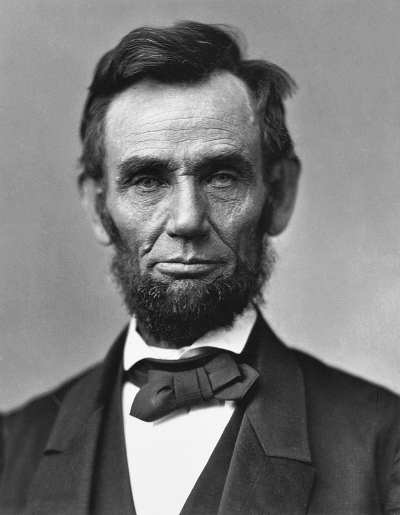
Abraham Lincoln was born on February 12, 1809 in Hardin County, Kentucky. His family moved to Indiana in 1816 and then to Illinois in 1830. He self taught himself the law and passed the Illinois bar to become a lawyer. Additionally, he became involved in politics and joined the Whig party. The Whig party later dissolved and he became a Republican. He was elected to the Illinois state legislature in 1834 and then to the House of Representatives in 1846. His stance against the Mexican American War made him unpopular and he did not seek reelection in 1849.
What gained Lincoln national attention was his debates against pro-slavery Stephen Douglas during their 1858 senatorial race. Stephen Douglas helped pass the Kansas-Nebraska Act of 1854 and he was in favor of popular sovereignty. Lincoln was fervently against slavery and its spread in the United States. Though Lincoln was unsuccessful in his run for senate, Lincoln cemented his reputation as an eloquent speaker for the Republican cause.
In 1860, Lincoln was nominated as the Republican party candidate for the president of the United States. His debates with Stephen Douglas and his Cooper Union speech made him the rising star of the party. In the presidential election of 1860, Lincoln defeated candidates Stephen Douglas (Democrat), John C. Breckenridge (Democrat), and John Bell (Constitutional Union Party) and became the 16th president of the United States.
Upon Lincoln’s election, eleven Southern states seceded from the Union due to his stance against slavery. They formed the Confederates States of America. On April 12, 1861, Confederate forces attacked the Union garrison at Fort Sumter. This started the American Civil War that was from 1861-1865.
During the Civil War, significant acts by Lincoln included:
- The Emancipation Proclamation that freed slaves owned by the Confederacy.
- The Gettysburg Address speech that he gave on November 19, 1863.
- Winning reelection in 1864.
- His appointment of Ulysses Grant to lead the Union Army in 1864.
On April 14, 1865, John Wilkes Booth shot Lincoln in the presidential box at Ford’s Theater. He was declared dead on April 15, 1865.
On December 6, 1865, Congress ratified the 13th Amendment that abolished slavery. Lincoln advocated for the passing of this amendment before he died. Lincoln will forever be known for his stance against slavery, his political brilliance, and his eloquent speeches.
To learn more about Lincoln’s life, I recommend visiting the History Channel’s webpage about Abraham Lincoln and also The Library of Congress website, which has digitized images of Lincoln’s handwritten works.
Two books that I recommend about Abraham Lincoln are Tried by War by James M. McPherson and Team of Rivals: The Political Genius of Abraham Lincoln by Doris Kearns Goodwin.
Michael Walsh is an Adult Services Librarian at the Will Library. Michael visited the spot that Abraham Lincoln gave his Gettysburg Address speech at the Gettysburg Battlefield.